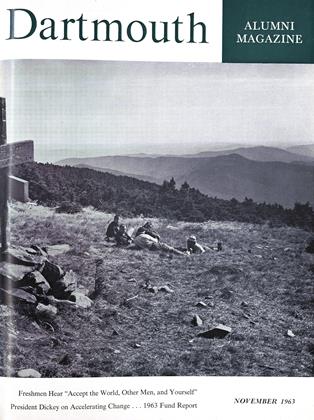The Convocation Addressby William Slade Backer '64,President of Dartmouth'sUndergraduate Council
THE IMPORTANCE of this occasion should be obvious to each of us. We have come together to celebrate a beginning, the one hundred and ninety-fifth Convocation of this College's business year. But this is not a beginning for the institution alone; it is a beginning for every individual.
We often hear of the opportunities and challenges which confront us here at Dartmouth. However, these lie not only in the direction of individual development. There is the chance that we, as members of the Dartmouth Family, may not become truly educated men.
It is true that during the undergraduate years a man is receptive, his mind sensitive, and that he is susceptible to growth by encountering new ideas and by striking out on his own. But it is because of his receptivity and his sensitivity that he is also susceptible to those things which inhibit personal development and, in fact, make a man smaller, not larger, than he may have been.
James Baldwin writes of the human predicament in wistful sadness: "Perhaps the whole root of our trouble, the human trouble, is that we will sacrifice all the beauty of our lives, will imprison ourselves in totems, taboos, crosses, blood sacrifices, steeples, mosques, races, armies, flags, nations, in order to deny the fact of death, which is the only fact we have.. . . One is responsible to life: It is the small beacon in that terrifying darkness from which we come and to which we shall return."
fearing an injury which has not befallen us. In short, we deny our responsibility to life. As young men who are being made to think about the day when we will be without the comfort of a small college in New Hampshire, we must, in all honesty, say that we are often the wilful captives of new comforters which help us to deny the difficulty of living in a complex world. By falling victim so early to the '"totems" and "taboos" which some of our contemporaries and elders would have us believe are necessary for success and survival in life which they are unable to cope with, we concede that life is too much for us before we have really begun. By accepting answers which are not the consequences of honest questions, we begin to use braces and crutches only
It is said man's thoughts are turning toward the "unthinkable," that "we have left the world of Descartes and Newton, with its closed boxes and have entered the world of Einstein and John Glenn with its open spaces." This is a natural consequence of human history and it stirs the minds and souls of men.
But there is a paradox. While man gallops into the heavens excited with mysteries and hellbent to solve them, which indeed he must, he complacently refuses to face up to his inability to free himself from the crosses under which he labors on earth. The result is often an unthinking acceptance of things the way they are, promise left unfulfilled, and a belief that we live only to breathe. In fact, this man denies his responsibility to himself.
No one can deny the difficulty of living in the world of men. There are prejudices, pressures and prisons of many kinds, all of which can separate a man from himself. Some of them are quite apparent such as the segregationist's attitude toward the Negro. Others are more subtle, such as the premium placed on compromise.
But I would like to ask you a question: If it is true that we are prisoners in any one of the many jails for the self, can we become educated men? If we are not free men, it will be impossible to become educated men, because not only will we have denied our responsibility to "negotiate life's passage as nobly as possible," but we will have thrown away our opportunity at this College because a man can have the liberating experience in education only if he is free from "totems'" and hereby free to learn. To call ourselves educated men all the time knowing that we are imprisoned by "taboos" is. first-rate hypocrisy.
Gentlemen, it is disheartening to think about a problem so large, but it is important that we do. We can be certain of two things as we leave here this morning; it will take considerable effort for each of us to come to terms with this difficulty . . . . "You must fly very hard to keep in the sun." But if we are to have any reason at all for being at Dartmouth, we must try very hard.
William S. Backer '64
 View Full Issue
View Full Issue
More From This Issue
-
 Feature
FeatureDARTMOUTH ALUMNI FUND REPORT
November 1963 By Charles F. Moore, Jr. '25 -
 Feature
Feature"Accept the World..., Other Men...and Yourself"
November 1963 -
 Feature
FeatureA TASTE FOR CHANGE
November 1963 -
 Feature
Feature"Turn Our Penitence Into Dedication"
November 1963 By Reverend Richard P. Unsworth. -
 Feature
FeatureThose First Happy, Day at Hectic Dartmount
November 1963 -
 Article
ArticleTHE UNDERGRADUATE CHAIR
November 1963
Article
-
 Article
ArticleStaff Appointments
April 1947 -
 Article
ArticleTHE COLLEGE
MARCH 1963 -
 Article
ArticleThayer School
OCTOBER 1962 By Edward S. Brown Jr. ’34 -
 Article
ArticleHanover Browsing
March 1952 By HERBERT F. WEST '22 -
 Article
ArticleMedical School
November 1941 By Rolf C. Syvertsen M'22 -
 Article
ArticleBig Green entrepreneurs cash in on ivy image
NOVEMBER 1984 By T. A.

